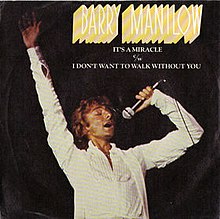
"If" is a song written by American singer-songwriter David Gates in 1971. Originally popularized by his group Bread, "If" charted at No. 4 on the U.S. Billboard Hot 100 when released as a single in 1971 and No. 6 in Canada. It also spent three weeks at No. 1 on the U.S. Easy Listening chart, and one week at the top of the Canadian AC chart.

"I Write the Songs" is a popular song written by Bruce Johnston in 1975 and released on his album Going Public in 1977. Barry Manilow's version reached number one on the Billboard Hot 100 chart in January 1976 after spending two weeks atop the Billboard adult contemporary chart in December 1975. It won a Grammy Award for Song of the Year and was nominated for Record of the Year in 1977. Billboard ranked it as the No. 13 song of 1976.

"More Love" is a 1967 hit single recorded by the American soul group The Miracles for Motown Records' Tamla label. The single, included on the group's 1967 album Make It Happen, later reissued in 1970 as The Tears of a Clown. Kim Carnes's 1980 cover of the song reached the Top 10 of Billboard's Adult Contemporary and Hot 100 charts.
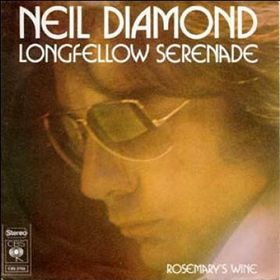
"Longfellow Serenade" is the title of a 1974 song by the American singer-songwriter Neil Diamond. It was written by Diamond, produced by Tom Catalano, and included on Diamond's album Serenade.

"Show and Tell" is a popular song written by Jerry Fuller and first recorded by Johnny Mathis in 1972. This original version made it to #36 on the Easy Listening chart.

"Keep on Singing" is a 1973 song composed by Danny Janssen and Bobby Hart, and was originally recorded by Austin Roberts from the album Austin Roberts. It was released as a single on Chelsea Records and reached No. 50 on the U.S. Billboard Hot 100 and No. 39 on the Cash Box Top 100. In Canada it reached # 79. "Keep on Singing" was best known as a hit single by Helen Reddy in 1974.

"Somewhere Down the Road" is a popular song written by Cynthia Weil and Tom Snow and most famously recorded in 1981 by Barry Manilow. Weil wrote the song's lyrics and Snow wrote the melody.

"Cupid" is a song by American singer Sam Cooke, released on May 16, 1961. It charted at number 17 on the Billboard Hot 100 and number 20 on the Hot R&B Sides chart; the track performed best in the United Kingdom, peaking at number seven on the UK Singles Chart. The song is featured on Cooke's greatest hits album, The Best of Sam Cooke (1962). Cooke's producers had asked him to write a song for a girl they had seen on a Perry Como TV show—but once they heard her sing, they kept "Cupid" for Cooke himself.

"Morning Side of the Mountain" is a song written by Larry Stock and Dick Manning and first recorded in 1951 by Tommy Edwards. It settled at #24 on the pop chart. Edwards re-recorded it in 1959, reaching #27 on the Billboard Hot 100. The re-release was featured as the B-side of Edwards' other hit, a cover of Johnnie Ray's 1952 success, "Please Mr. Sun."
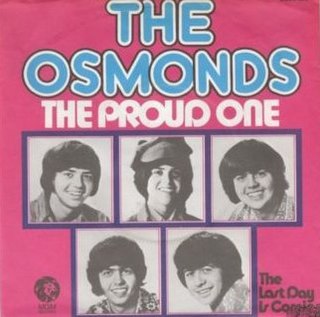
"The Proud One" is a 1966 single written by Bob Gaudio and Bob Crewe and originally performed by Frankie Valli as part of his debut solo album, The 4 Seasons Present Frankie Valli Solo. Valli's version, which featured the Seasons on instrumental backing but not vocals, peaked at #68 in the U.S. and #64 in Canada. Billboard claimed that "the electric sound of Valli is used to perfection in this powerful ballad, stating that the "easy-go dance beat [is] effective." Cash Box said that it is a "powerhouse" and that "the Valli sound holds the moving, teen-oriented tale of love together and the sweeping arrangement adds a must spin again quality to it."

"This One's for You" is the title track from the 1976 album by Barry Manilow with words and music by Manilow and Marty Panzer. The song peaked at number 29 on the Billboard Hot 100, and at number one on the Easy Listening chart, reaching the top position for one week in November 1976, Manilow's fifth number one overall on that chart.

"Swearin' to God" is a song written by Bob Crewe and Denny Randell. It was recorded by Frankie Valli and released in May 1975 as a single from his album Closeup. It is a love song whose lyrical hook is a more literal use of the expression "I swear to God" :
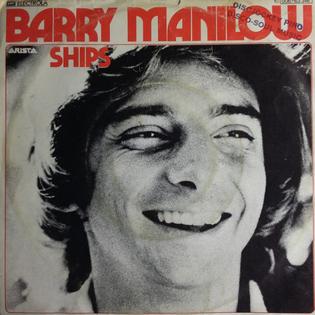
"Ships" is a song written and originally performed by British musician Ian Hunter. The song was first released on Hunter's fourth solo album, You're Never Alone with a Schizophrenic in March 1979, and later released as a single in August 1979. Hunter's release of the single never made the charts. The song is said to be about Ian's relationship with his father.

"Stormy" is a hit song by the Classics IV released on their LP Mamas and Papas/Soul Train in 1968. It entered Billboard Magazine October 26, 1968, peaking at #5 on the U.S. Billboard Hot 100 chart and #26 Easy Listening. The final line of the chorus has the singer pleading to the girl: "Bring back that sunny day". The single, along with the prior release of "Spooky" and, soon after, the release of "Traces", formed a trio of solid hits for the band.

"Ready to Take a Chance Again" is a 1978 international hit single performed by Barry Manilow. The song was composed by Charles Fox, with lyrics by Fox's writing partner, Norman Gimbel. Manilow conceived and supervised the song's recording in partnership with Ron Dante.

"I Like Dreamin'" is the debut single by Kenny Nolan, taken from his eponymous debut album. The recording was issued as the album's lead single in October 1976, spending 27 weeks on the U.S. Billboard Hot 100.

"Save It for a Rainy Day" is a song by American singer/songwriter Stephen Bishop. The song was the first of two hit singles from his debut album, Careless. It features a guitar solo by Eric Clapton and Chaka Khan on backing vocals toward the close of the song.
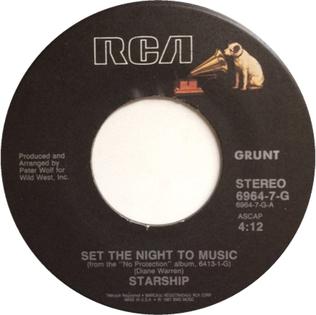
"Set the Night to Music" is a song written by Diane Warren and recorded by Starship on their LP, No Protection (1987). It became a major hit for Roberta Flack in 1991. Starship's original version became a Top 10 hit on the U.S. Billboard Adult Contemporary chart, reaching number nine in the spring of 1988, and also charted minorly in Canada. The song appeared at the end credits of the 1988 fantasy-comedy film Vice Versa starring Judge Reinhold and Fred Savage.

"The Drum" is a song recorded by Bobby Sherman from his Portrait Of Bobby LP. It was released as a single in the spring of 1971, the second of two from the album. The song was written by Alan O'Day, his first of five Top 40 chart credits.

"Don't Throw It All Away" is a song written by British musician Gary Benson and first released by the Shadows on their 1975 album Specs Appeal. Benson released his version as a single later the same year, which reached number 20 on the UK Singles Chart in the fall of 1975.
